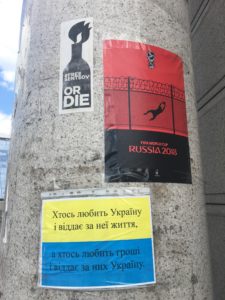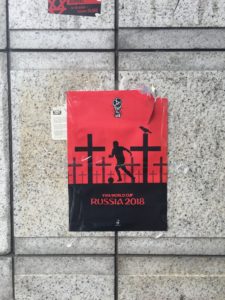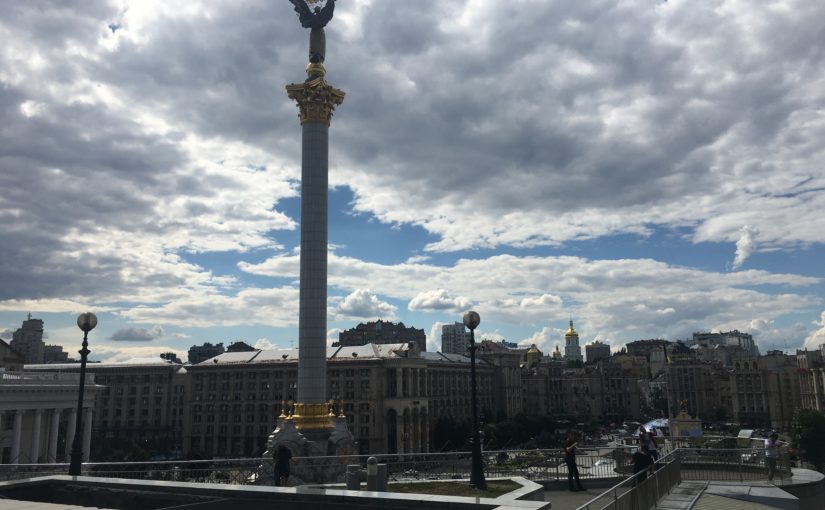After being immersed in a different culture for the past five weeks, it feels very weird to have to say goodbye. Perhaps it’s because this is the first time I’ve been the Europe, or because this is the longest amount of time I have lived abroad, but I am still struck by how normal everything is here. For all the differences in language, culture, architecture, history, and politics, life in Ukraine is pretty much like life anywhere else. People are people, regardless of what label you stick on them.
That being said, the things that make us different are also incredibly important: our differences are what help shape our identity and give us individuality. United by our common humanity but also defined by our separate characteristics, talents, and goals, there is a fine line to walk between celebrating our diversity and citing our differences as reason to divide us. Many countries, including the United States, are still struggling with this problem right now, but the issue is particularly language-centric in Ukraine.
My teacher refers to the issue of language in Ukraine as яблоко раздора (apple of discord, bone of contention). In eastern Ukraine, the war in Donbass continues between pro-Russian separatist forces and the Ukrainian military, while in Lvov, the cultural center of Ukraine, Ukrainian is overwhelmingly spoken. In Kiev, the capital of Ukraine, both Russian and Ukrainian is widely spoken and understood, yet there is a growing number of people who refuse to speak Russian and insist on only speaking Ukrainian. Some restaurants have menus in Ukrainian, Russian, and English, while others only have menus in Ukrainian and English. According to one taxi driver, while at least 70% of the Ukrainian population can speak both Ukrainian and Russian, many more people are choosing to only speak in Ukrainian. My teacher at school also said that a few years ago, when she would speak Russian to someone on the street, they would reply in Russian. But now, people reply in Ukrainian and refuse to switch languages.

This is both a cultural and political issue that has a long history, but in terms of modern context, it dates back to at least the 19th century when Ukraine was part of the Russian Empire. The Ukrainian language was banned in the 1860s, during the time of Taras Shevchenko, who is considered the founder of modern Ukrainian literature and arguably the most iconic figure in Ukrainian history (think: Founding Fathers, but if the British had imprisoned all of them for life after the Constitutional Convention). Born into serfdom, Shevchenko became a poet, writer, artist and political figure who promoted Ukrainian nationalism and suffered greatly for his opposing political views to the Russian Empire at the time. While I am not an expert on the complicated relationship between the use of the Russian and Ukrainian languages in Ukraine today, it seems to me that the recent trend towards speaking only Ukrainian is an attempt to establish a national identity that is separate and independent from Russia. Especially given the annexation of Crimea and Революция Достоинства (Revolution of Dignity) in 2014, Ukraine is seeking to disassociate itself with Russia, both on a domestic and international level.


Linguistically, there has been another shift, from using the preposition на (in) to the preposition в (in) when talking about Ukraine. While the preposition на is used for provinces, the preposition в is used for cities and countries. During Soviet times, people would say на Украине (in Ukraine), because Ukraine was part of the Soviet Union. However, after Ukrainian independence, people started saying в Украине (in Ukraine), because Ukraine became an independent country. A really good way to make Ukrainians angry, besides speaking in Russian, is to say на Украине instead of в Украине. Being aware of this nuance in Russian, it has also started to bother me in English when people refer to Ukraine as “the” Ukraine. That’s like saying “the” Russia, “the” Germany, or “the” Canada. It sounds weird, right? Ukraine is a country; it doesn’t need an article in front of it.
I have been asked many times why I came to Ukraine to learn Russian (hello there’s another country to the north that might of better interest), and the answer comes down to finances and feasibility. However, while circumstance brought me to Ukraine instead of Russia, I am wholly grateful that it did. While this past election in the US made it difficult for me to invest my energy in politics anymore, spending time in Ukraine has reminded me of why I became a political science major in the first place: human rights. Every person in the world deserves to be treated with dignity and respect, and seeing how Russia has violated that prerogative in Ukraine has renewed my interest in both pursuing politics and mastering the Russian language in order to better communicate and understand this part of the world.
